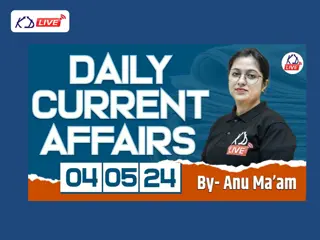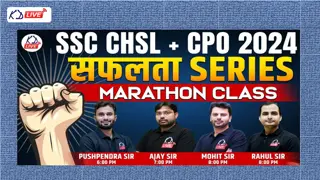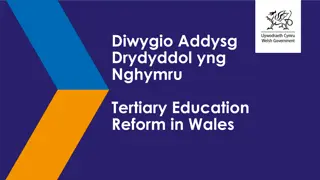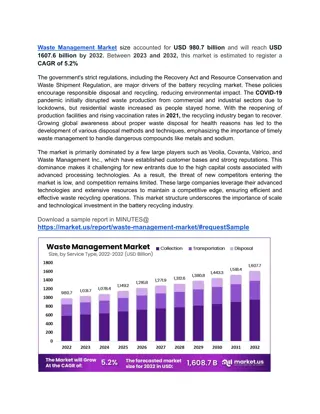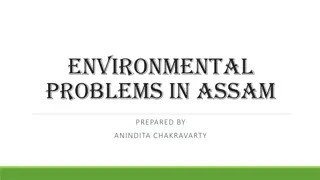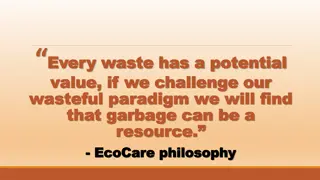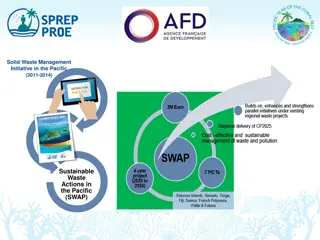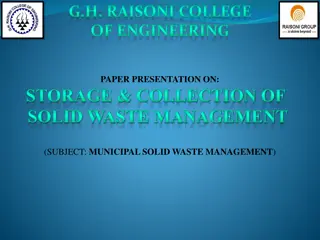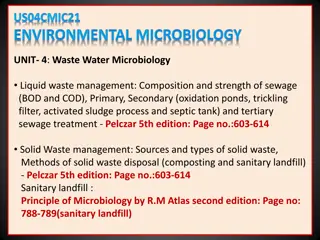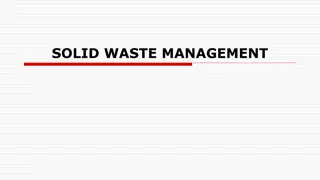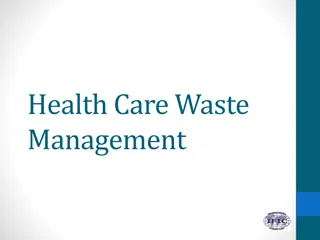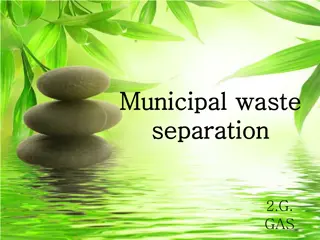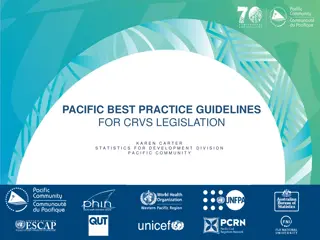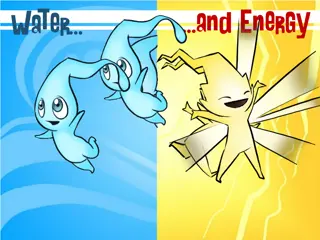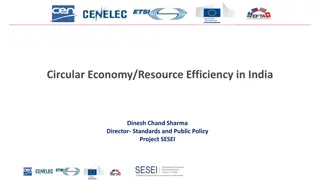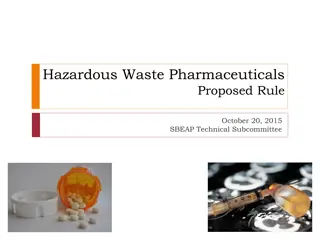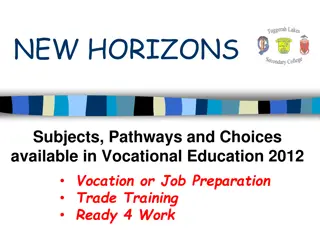Overview of Tertiary and Vocational Waste Management Courses in the Pacific Region
Conducted by Isoa Korovulavula at The Institute of Applied Sciences, University of the South Pacific, the stocktake for PacWaste Plus Programme aimed to identify waste management courses in tertiary and vocational institutions across the Pacific. Key institutions included Fiji National University, University of Fiji, and others, offering courses relevant to PacWaste Plus objectives. The assessment output focused on compiling available courses in waste management within the region.
Download Presentation

Please find below an Image/Link to download the presentation.
The content on the website is provided AS IS for your information and personal use only. It may not be sold, licensed, or shared on other websites without obtaining consent from the author. Download presentation by click this link. If you encounter any issues during the download, it is possible that the publisher has removed the file from their server.
E N D
Presentation Transcript
Stock take of available Tertiary and Vocational Waste Management Courses in the Pacific Region For The PacWaste Plus Programme Isoa Korovulavula The Institute of Applied Sciences The University of the South Pacific 10-12 February 2020 Tanoa International, Nadi, Fiji
Objectives : 1. Identify Waste Management courses available in tertiary and vocational institutions in the Pacific region, specific to the 15 participating countries. 2. Confirm the content of the identified available courses 3. Identify waste management courses from other SPREP member countries (including metropolitan members) offered in recognized tertiary and vocational institutions relevant to the PacWastePlus programme .
Three major tasks 1. Desk review 2. Content confirmation 3. Consolidation and synthesis
What is the main output of this assessment? Seek to undertake a stock take of all available courses/ programme in the Tertiary and Vocational field of Waste management in the Pacific region, in relation to the 15 participating countries of the PacWaste Plus programme.
Key Tertiary Academic Institutions The Fiji National University; The University of Fiji; Solomon Island National University; The National Samoa University; The University of Papua New Guinea; The University of the South Pacific; and The National University of Timor-Leste.
Key Vocational Institutions Centre for Appropriate Technology Development Fiji Montfort Boys Town Tutu Rural Training Centre TVET programs offered in the institutions below. o Public university - Fiji National University; o Private university The University of Fiji; o The National University of Samoa; o Regional institutions The University of South Pacific; and o Regional institution - Australia-Pacific Technical College.
Key Non-Academic Institutions The Training Centers in Government Ministries and departments; Training programs offered by Civil Society Groups specifically environment, youth and women s groups; and Private Institutions that carry out waste management certified accreditation training. SPREP JPRISM
Task 1: Desk Review Accessing the information that is needed through official correspondence with the targeted agency Identify relevant contact persons on waste management training courses in each country will also require the involvement of the in-country based PacWaste Plus project coordinators Key Ministries that are involved in professional training to be identified and contacted accordingly. For Timor-Leste if there are not adequate information on waste management training courses provided through emails from the various on-ground sources there will be a need to travel there to gather training information
Key activities for Task 1 The collection, organizing and synthesizing available waste management training information. This would also provide an understanding of the scope of and depth of these materials.
The information that will be gathered will be organized based on the following factors: Specific area of focus of the training course or programme; The training courses and programs that are still being offered and Provide a historical chronicle account of the various waste management training courses and programmes.
Task 2: Content confirmation Course Title Course Objective Course expected output and outcome
Key questions 1. What is the length of the course? 2. What is the delivery method of the course? Online or face to face? 3. What are the pre-requisites or entry requirements for the course? 4. Does the course use college credits, or can you cross-credit courses? 5. Does the course offer any field work experience? And what is it. 6. What kind of qualification is derived from the course? 7. Does the course deliver competency-based training with exams or just participation? 8. What are the details of trainers and their qualifications?
Key Questions cont 8. What is the cost of the course? 9. Is the course offered regularly or one off? 10.What is the lifespan and sustainability of these training courses? 11.What feedback from participants have been received as to the appropriateness and usefulness of the course? 12.Which of the PacWastePlus priority waste streams are addressed by this course? 13.What other topics does this course cover that are not waste related? (Finance, probity, data management, monitoring, communications) 14.What is the number of people that have enrolled and completed the course over the past 5 years? 15.Does the completion of this course qualify for internationally recognized certification ?
Task 3: Consolidation and Final Synthesis This is the final synthesis and consolidation of all the waste management capacity building courses and programme stock findings. This should also provide an insight to the gaps as well as what can be strengthened in these courses and programs
Project Schedule Tasks related Activities Task 1 Desk Review 1.1 Collection 1.2 Organization 1.3 Synthesis Jan-20 Feb-20 Mar-20 Apr-20 May-20 Task 2 Content Confirmation 2 .1 Development of the e-questionnaire 2.2 Test and Validation of the e-questionnaire 2.3 Dissemination of the e-questionnaire 2.4 Consolidating and analysing of the results from the questionnaire Task 3 Final Synthesis 3.1 Draft of the report 3.2 Finalizing of the report and submission 3.3 Submission of the final revised report based on comments from PacWaste Plus Secretariat
Thank you Vinaka Questions & Comments






